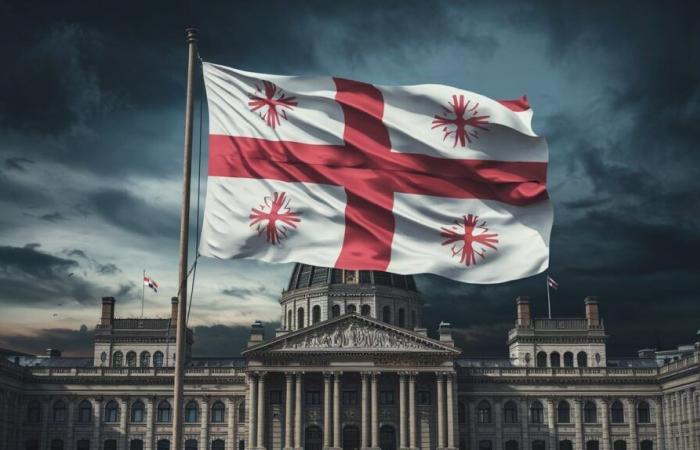Georgia on the verge of political implosion? The inauguration of a president loyal to power but contested by the opposition promises to inflame minds even further. Pro-EU demonstrations intensify, the West sanctions, the outgoing president refuses to give up her seat. How far will this unprecedented crisis go?
While pro-European demonstrations have been increasing for weeks in Georgia, the country is preparing to experience a presidential inauguration under high tension this Sunday. Mikheïl Kavelashvili, a former footballer known for his ultraconservative and anti-Western positions, must take the oath during a ceremony organized behind closed doors in Parliament. An investiture which only fuels the anger of the opposition, already up in arms against the government since the controversial legislative elections last October.
A political crisis that is getting bogged down
Since the victory of the ruling Georgian Dream party in the legislative elections on October 26, Georgia has been going through a serious political crisis. The pro-Western opposition denounces rigged elections and demands the organization of new elections. At the same time, thousands of Georgians in favor of rapid integration into the European Union take to the streets every day to protest against the government's decision to postpone this objective to 2028.
It is in this electric context that Mikheïl Kavelashvili, a believer of the Georgian Dream, is preparing to become the new president of Georgia. A position that is certainly honorary, but which crystallizes all the tensions. The outgoing president, Salomé Zourabichvili, refuses to give up her place until new legislative elections have been organized.
A closed-door inauguration that goes badly
To avoid any excess, the investiture ceremony will be held for the first time behind closed doors in Parliament. An exceptional security system which only reinforces the feeling of an illegitimate investiture in the eyes of opponents. Like Natia, 27, a graduate in political science, who assures that this inauguration “will have no meaning”. “Kavelashvili will never be president of Georgia. Just like the Georgian Dream will never be the ruling force of the country, because it is not a legitimate government,” she says.
A refusal by Ms. Zourabichvili to leave the presidential palace “would constitute a criminal offense punishable by many years of imprisonment,” warned the Prime MinisterIrakli Kobakhidzé
The opposition does not disarm
Despite the government's threats, the opposition does not intend to give up. On Saturday, several thousand people formed a human chain along the river that runs through Tbilisi, the capital, as a sign of protest. Outgoing President Salomé Zourabichvili was present among the demonstrators. This former French diplomat also called this week on the Georgian army to “remain loyal” to her, ensuring that she remained its “commander in chief”.
Faced with this revolt, those in power are toughening their tone. After having dispersed certain gatherings by force, with water cannons and tear gas, he is now threatening legal action. According to sources close to the matter, more than 400 people were arrested, including opposition leaders. The Georgian human rights commissioner even reports “torture” of certain detainees.
The international community raises its voice
This authoritarian drift worries the international community. The United States and the United Kingdom have just imposed sanctions against several senior Georgian officials for the violent repression of pro-European demonstrations. Washington also targeted billionaire Bidzina Ivanishvili, considered the true strongman of the Georgian Dream.
Beyond the current crisis, the entire policy of the ruling party is being called into question. Arriving more than ten years ago with a liberal and pro-European program, the Georgian Dream is accused by its detractors of having gradually abandoned its ideals to sink into authoritarianism. This is evidenced by the recent controversial laws on the media and civil society, directly inspired by Russian legislation, or the decline in the rights of LGBT+ people.
The inauguration of Mikheïl Kavelashvili this Sunday should not calm the spirits in Georgia, quite the contrary. In this small Caucasian country where a struggle for influence is playing out between Moscow and the West, the political crisis promises to last. It remains to be seen who, the government or the streets, will end up having the last word.
Faced with this revolt, those in power are toughening their tone. After having dispersed certain gatherings by force, with water cannons and tear gas, he is now threatening legal action. According to sources close to the matter, more than 400 people were arrested, including opposition leaders. The Georgian human rights commissioner even reports “torture” of certain detainees.
The international community raises its voice
This authoritarian drift worries the international community. The United States and the United Kingdom have just imposed sanctions against several senior Georgian officials for the violent repression of pro-European demonstrations. Washington also targeted billionaire Bidzina Ivanishvili, considered the true strongman of the Georgian Dream.
Beyond the current crisis, the entire policy of the ruling party is being called into question. Arriving more than ten years ago with a liberal and pro-European program, the Georgian Dream is accused by its detractors of having gradually abandoned its ideals to sink into authoritarianism. This is evidenced by the recent controversial laws on the media and civil society, directly inspired by Russian legislation, or the decline in the rights of LGBT+ people.
The inauguration of Mikheïl Kavelashvili this Sunday should not calm the spirits in Georgia, quite the contrary. In this small Caucasian country where a struggle for influence is playing out between Moscow and the West, the political crisis promises to last. It remains to be seen who, the government or the streets, will end up having the last word.






